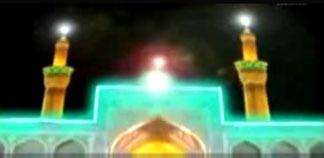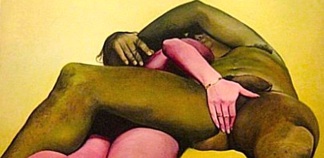به زبان فارسی
PICTORY
LATEST MUSIC
SEARCH
WOMEN
16-Jan-2009 (2 comments)
The Glass House, competing in the World Documentary category at the Sundance Film Festival, is a one of those rare films that make you forget that you are watching a documentary. Hamid Rahmanian and Melissa Hibbard have given us a documentary that flows as easily as the tears of their young and troubled protagonists. The film, which Rahmanian shoots and directs, unravels the lives of downtrodden, runaway and distressed girls who have taken refuge in a private half-way house established by a benevolent Iranian expatriate, Marjaneh Halati>>>
MEDIA
13-Jan-2009 (16 comments)
After about 70 years in existence, the BBC Persian Service is naturally a household name in Iran. In a move calculated to expand its reach in the Islamic Republic, BBC Persian has ventured into television. Launch is just weeks away. Though satellite television is illegal in Iran, more than half its urban dwellers have access to satellite television by some estimates. Over the past few years, the number of Persian-language satellite stations has continued to grow. At last count, there were about 50 stations, most of which are based in Los Angeles, home to the largest Iranian expat community>>>
2009
04-Jan-2009 (4 comments)
As long as we are alive (and alas, many are not), and we still have a functioning mind and heart, and good friends to remind us of that, we can still live a worthy life: Simply absorb the meaning of the characters inscribed on the Tsukubai (water basin) behind the Rock Garden in at the Ryoanji Temple in Kyoto: "I learn to be content". These five words can be understood in different ways, but when I came across them in January, I realized that we, Iranians, got it all wrong when we followed the carpe diem philosophy of Khayyam, when he claimed, a wine cup in one hand and the tresses of his beloved in the other:>>>
FOROUGH
02-Jan-2009
Two months ago I had an opportunity to see Claus Strigel’s film MOON SUN FLOWER GAME at the Iranian Film Festival in Chicago. It was a fascinating experience! I must admit that I have been deeply engaged and obsessed to learn about Hossein Mansouri's life -- a great poet living in Munich now-- since Forough Farrokhzad’s death. I wrote a review... then I decided to interview Claus... In 1962 the young poetess Forough Farrokhzad visited the lepers at the end of the earth to make a film about their world. Her film, “The House is Black”, was to become world famous, and, by and by, change a small world too: the world of a small boy who had the good fortune to meet her.
>>>
INTELLIGENCE
27-Dec-2008 (3 comments)
خانم مهین اشتری در همان دقایق اول با ایفای نقش قوی خود مرا مجذوب موضوع داستان کرد و چیزی نگذشت که فهمیدم آقای کاظم اشتری کیست. از این گونه کاظم ها ما در جامه بسیار داریم و در زندگی روزمره با آنها برخورد داشته ایم. ولی آنچه نظیرش کمتر هست خود خانم اشتری است. او با یک تفکر واقع گرایانه و با استفاده از رنج های پنهانی سالهای سپری شده اش تصمیم گرفته بجای کینه و بجای دشمنی با معشوقه ی سابق همسرش ، که او نیز قربانی آقای اشتری بوده ، یک همکاری دوستانه و منصفانه را آغاز کند که بنفع خودش ، دخترش و معشوقه ی سابق همسرش باشد. تمام زیبایی و نکته نمایشنامه در همین تصمیم خلاصه می شود که بسیار انسانی، فمینیستی و خرد گرایانه است و اسلحه ایست قویتر از خنجر!>>>
CULTURE
15-Dec-2008 (3 comments)
فرهنگ زدایی شاخ و دم ندارد. به همین سادگی آب می بندند به پاسارگاد! از زیر چهارباغ مترو رد می کنند و در کنار بیستون بایست حتماً یک اتوبان بسازند تا تمام علائم گذشته و تمدن پیشین محو شود. به همین سادگی! تصورش را بکنید که یک کشور هفتاد و چند میلیونی فقط چند سالن تئاترش فعال باشد! و تازه فعال ترین سالن در معرض انواع و اقسام تهدیدهاست. می خواهند از زیرش مترو رد کنند! در سی سال گذشته، در هر گوشه پارک دانشجو مسجدی ساخته اند و از یاد نبریم که تمام نمایشهایی که در این سالن اجرا می شود از زیر دست و نظر و خودکامگی های صاف چی های ارشادی و ممیزی های گوناگون گذشته است. >>>
PIONEER
13-Dec-2008 (4 comments)
Sarkis Djanbazian was the first ballet master, choreographer, and producer who established a ballet academy in Iran. He was also the first male ballet dancer who performed on stage in different cities in Iran. Owing to his significant contributions to teaching, staging, and raising awareness towards ballet in Iran, Djanbazian is widely regarded as “the Father of Ballet in Iran”. Sarkis Djanbazian was born on January 15, 1913 in Armaveer in Armenia. From early childhood, he took an avid interest in the arts especially in dance. After graduating from high school, he went to Leningrad to study dance. He graduated from Vaganova Dance Academy of Leningrad and from Lesgaf University with a Masters of Arts degree. After graduation, he worked as a principal dancer, choreographer, and artistic director in Kirov Theatre in Leningrad until July of 1938>>>
MUSIC
11-Dec-2008
بنظر می آید اینروزها رپ فارس وارد مرحلۀ جدید دیگری شده است و با به میدان آمدن رپ خوان های معترضی مانند «ماهور» و «بهرام» از شاخه ای جدید در صحنۀ هیپ هاپ ایران، یعنی رپ آگاه، اعتراضی و یا رپ انتقادی-اجتماعی به ما خبر می دهد. «بهرام» یکی از رپ خوان های فعال در صحنۀ هیپ هاپ ایران می باشد که بتازگی نامش بر سر زبان طرفداران و شنوندگان کنجکاو موسیقی رپ فارس افتاده است و شهرت وی به عنوان آوای معترض نسل جوان و تحولجوی داخل ایران حتی به آنسوی مرزهای ایران نیز رسیده است. یکی از قطعه های رپ خوانی که از «بهرام» در وبلاگ ها و سایت های ویژۀ موسیقی رپ فارس انتشار پیدا کرده و به سرعت نام وی را به عنوان یکی از معدود رپ خوان های انتقادی-اجتماعی درون-مرزی معرفی و مطرح کرد، رپ-نوشته ای بود تحت عنوان "نامه ای به رئیس جمهور".>>>
CULTURE
03-Dec-2008 (one comment)
وجدی موواد در زمینه تئاتر، نمایشنامه نویس و کارگردان و بازیگر است و جوایز بسیاری دریافت کرده که یکی از آنها جایزه مولیر در سال 2005 است که آن را به دلیل بی توجهی ناشران به کار نمایشنامه نویسان جوان در فرانسه رد کرد. او در فرانسه بسیار محبوب است و در سالهای اخیر نمایشنامه هایش مرتب در سالنها به روی صحنه رفته است و یا در جشنواره های فرانسه اجرا می شود. نمایشنامه "حریق"، با مرگ زنی آغاز می شود و با خواندن وصیت نامه اش. او برای هر یک از دو فرزند بازمانده (یک دختر و پسر دوقلو)، نامه ای گذاشته است که در آن نامه از هر دوشان می خواهد به جستجوی پدر و برادر خود بروند و نامه ای از مادر خود را به او بدهند. "حریق" بازتاب جنگ و پرتاب شدن در جهانی سوزان و در میان شعله های آتش است.>>>
SMART
02-Dec-2008 (5 comments)
Last March I went to see Darvag Theater’s play, In Memory of Kazem Ashtari with dear friends in Berkeley. I was blown away by the play’s original storyline, the crisp and clever dialogue, and the stellar performances of its cast. I found the whirlwind of plot twists and developments dazzling and so entertaining! Sepideh Khosrowjah’s dialogues all through a complex plot were exquisitely simple, yet thought provoking. What would a woman do when her husband dies suddenly? What would she and her late husband’s mistress tell each other if they were to meet? This story is delicious!>>>
OBSERVER
01-Dec-2008 (4 comments)
I have always been drawn to those who are dangerous in some way: those who love too passionately, who think (and act) too radically, whose imaginations are easily heated to incandescence. So I should not complain when I get burned and lose everything. We need to experience the “Grand Passions” at least once in our lives. We need to live life at white-hot heat to feel that we are truly alive and human. “I am alive, therefore I bleed. I am human, therefore I weep”. But what I value more than the “grand passions” of Life is a subtler form of emotion that is paradoxically more potent than passion. I hesitate to call it “tenderness” because that word has other implications, but I have no other word large or clean enough to describe it. Physical consummation is no more than a crude metaphor for this Love. It flows from the most vulnerable places in us, those of least resistance which, I suppose, we have to call the “soul”.>>>
RECENT COMMENTS
IRANIANS OF THE DAY
| Person | About | Day |
|---|---|---|
| نسرین ستوده: زندانی روز | Dec 04 | |
| Saeed Malekpour: Prisoner of the day | Lawyer says death sentence suspended | Dec 03 |
| Majid Tavakoli: Prisoner of the day | Iterview with mother | Dec 02 |
| احسان نراقی: جامعه شناس و نویسنده ۱۳۰۵-۱۳۹۱ | Dec 02 | |
| Nasrin Sotoudeh: Prisoner of the day | 46 days on hunger strike | Dec 01 |
| Nasrin Sotoudeh: Graffiti | In Barcelona | Nov 30 |
| گوهر عشقی: مادر ستار بهشتی | Nov 30 | |
| Abdollah Momeni: Prisoner of the day | Activist denied leave and family visits for 1.5 years | Nov 30 |
| محمد کلالی: یکی از حمله کنندگان به سفارت ایران در برلین | Nov 29 | |
| Habibollah Golparipour: Prisoner of the day | Kurdish Activist on Death Row | Nov 28 |
















